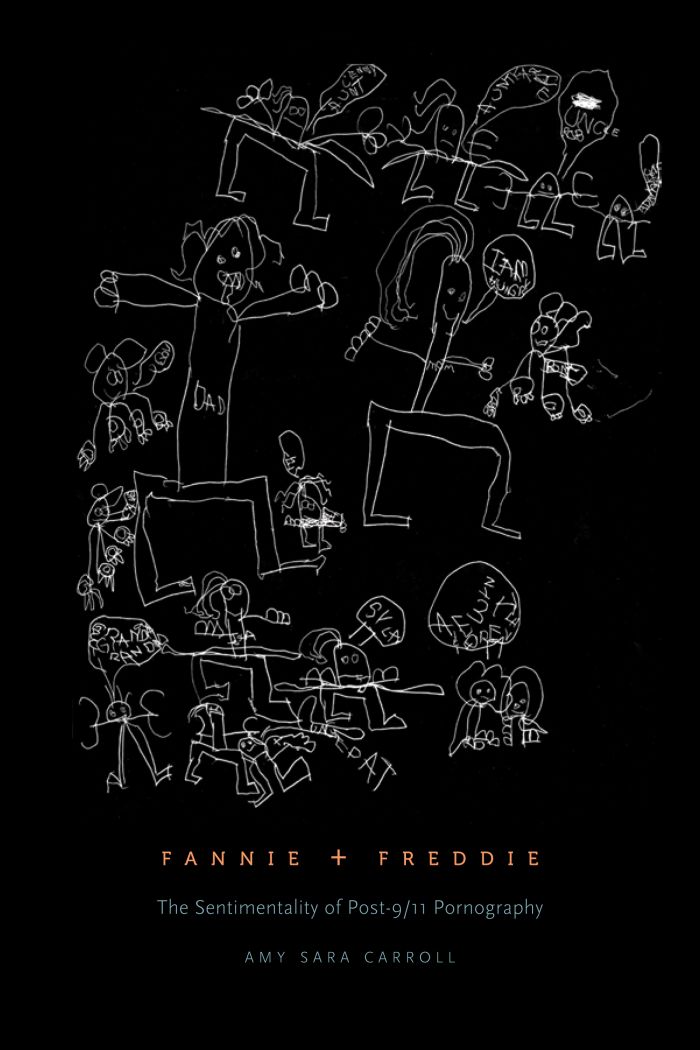Fannie + Freddie
The Sentimentality of Post–9/11 Pornography

This book can be opened with

Materialist, feminist, queer, hybrid—channeling the sensibilities of Gloria Anzaldúa, Rosario Castellanos, Mary Kelly, Teresa Hak Kyung Cha, Cecilia Vicuña, Patssi Valdez, Bernadette Mayer—Carroll’s second collection of prose poems and wordimages contemplates the cost of living in an era of “cruel optimism.” Procedurally
formalizing self-editing and indecision, Carroll undocuments the quotidian’s shades of gray/grey, the contingencies of post-Fordist relationality in the pre-Occupy window of time between September 11, 2001, and the 2008 recession. “Cognative dissonance” meets “the rite to be a citizen.” “What is the difference between
neoliberalism and globalization?” tempers the countercultural question “And, me?” In Fannie + Freddie / The Sentimentality of Post–9/11 Pornography, Carroll muses, “Like Sammy and Rosie, Fannie and Freddie got laid.”
Off-grid, she mixes metaphors, criss-crossing the borders erected between the lyric and the conceptual “I.” She crosses out the dividing lines elected to maintain performance art, visual culture, and poetry as discrete, clairvoyant media of social engagement. She layers jokes, puns, riddles, platitudes, hackneyed phrases, adages, boilerplate, buzzwords, mottos, proverbs, rubber-stamp rhetoric, slogans, threadbare phrases, trite remarks, and truisms over one another to provide a portrait of the contemporary American landscape as experienced by working- and middle-class Americans. Carroll offers an elaborate palimpsest of text and images—text that is often shaded, crossed out, or printed over other text or images.
Claudia Rankine, who chose the volume for Fordham University’s 2011–12 Poets Out Loud Prize, succinctly sings its praises: “The intelligence, compassion, and dimensionality of this collection place it in a category all its own—it belongs to and is crafted out of the psychic anxieties of the twenty-first century. I, for one, was both
exhilarated and humbled by Fannie + Freddie / The Sentimentality of Post–9/11 Pornography.”
Fannie+Freddie uses poetry to perform and document (or, as Carroll has suggested, 'undocument') the capitalist roller coaster of the 2000s in pieces that are compellingly personal and insistently social, and that remind us how deeply our globalized crises are inscribed on the body.——Make/shift
Amy Sara Carroll offers here an infrared snapshot of affective anachronism that lives the before-and-after of love and war in a poetic of the present flooded by history, memory, sensation, and relation. Wielding female complaint, maternal sentimentality, activist polemic, and auto-ethnographic documentation, its palimpsest feels out for form and refuses whatever is easy in its offerings. How can we live the unbearable in attachment to life amidst the force of the details that give and disturb its shape? The noisy beauty of the image that Carroll provides is powerful and sensational in the best of all senses.——Lauren Berlant, University of Chicago
A restrained genius: the kind that flares.——Bhanu Kapil, Naropa University
What is Amy Sara Carroll’s Fannie + Freddie? It’s ‘a dissident text’ of ‘home-grown, elemental earthiness’ in which the domestic sphere responds to urgent global warnings. It’s a labor-intensive work of pregnant pauses in the passionate life of the artist occupying a female body. It’s una prosa poética of double-crossing borders dividing self and other, a legally admissible document of creative and critical testimonio. It’s a self-revealing artist’s book in which the vindictive family romance bubbles to the surface as a palimpsest of identity inscriptions. It’s a heartbreaking work of harrowing ingenuity.——Harryette Mullen, University of California, Los Angeles
“The prescient prose poems of Amy Sara Carroll’s Fannie + Freddie / The Sentimentality of Post–9/11 Pornography—made ever more tangible by erasures,
——Mark Nowak, Manhattanville College
overwrites, strikethroughs, grayscaling, and photo-text simulacra—re-conceptualize the current economic crisis through (and upon) the individual human body that struggles to survive this global ‘free’ market collapse. Carroll’s texts are, indeed, brave strophes for a catastrophic era.”

